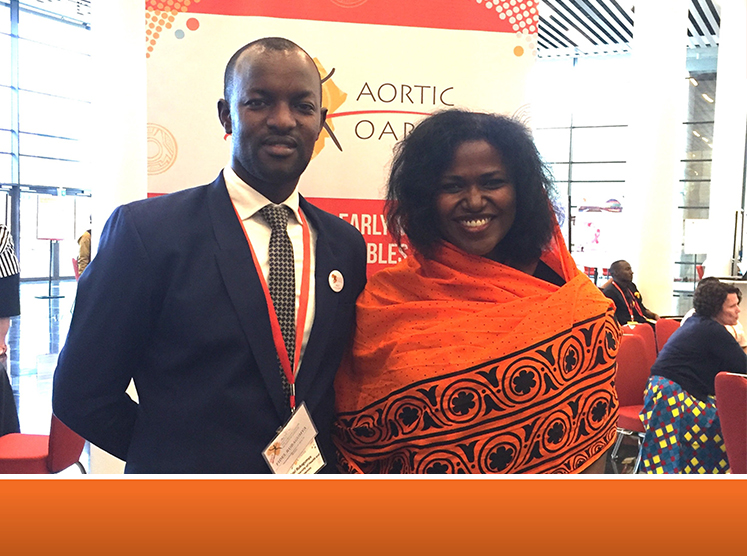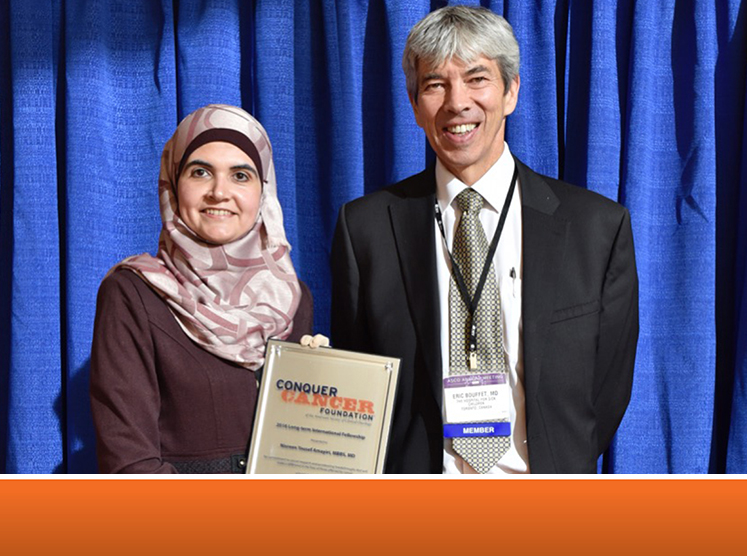Mar 09, 2023
By Jimmy O’Hara, Conquer Cancer
An eager group of oncologists from around the world enters the ASCO Annual Meeting for the first time. The oncologists—recipients of the International Development and Education Award (IDEA) from ASCO and Conquer Cancer, the ASCO Foundation—belong to this global community of the brightest minds in cancer research. Each of them shares a vision to advance research and care for patients in their home country.
IDEA alumni Fidel Rubagumya, MD, MMed, of the Rwanda Military Hospital, Gevorg Tamamyan, MD, PhD, MSc, of the Pediatric Cancer and Blood Disorders Center of Armenia, and Nisreen Amayiri, MD, of the King Hussein Cancer Center (KHCC) in Jordan, know just how idea-generating and life-changing this learning experience during and after Annual Meeting can be. They—and by extension, their patients—continue to benefit from the IDEA program today.
“IDEA was my first acquaintance with ASCO and its possibilities,” said Dr. Tamamyan, who focuses his research on patients with leukemia and pediatric cancer. “In the middle of this rush and busy atmosphere, there were wonderful people who were taking care of a group of young cancer physicians and researchers from low- and middle-income countries (LMICs), acquainting us with the new reality of being a part of this big ASCO family.”
The IDEA program, funded by Conquer Cancer, serves as a springboard for early-career oncologists in LMICs, providing mentorship, networking, and support for their attendance at the Annual Meeting. Accessing this pivotal event can be a major opportunity for many researchers from abroad who may otherwise lack the means to attend. IDEA recipients are equipped with the vital resources they need to spark new research questions and ignite better care for patients back home.
“One ASCO Annual Meeting led to several possibilities,” said Dr. Rubagumya, a clinical and radiation oncologist focused on health services research. “I was inspired by several sessions I attended during the meeting, specifically those dedicated to IDEA awardees.”
IDEA facilitates the sharing of knowledge between recipients and other ASCO members. Each awardee is paired with an ASCO member mentor who helps to expand their professional network and share their knowledge and best practices in cancer research and care. The IDEA program also immerses recipients in a post-meeting visit to their mentor’s institution. Through these experiences, IDEA recipients often forge lasting relationships with their mentors, remaining connected long after the program concludes.
These meaningful partnerships are invaluable for helping IDEA alumni to mark research milestones for patients on local and regional scales. Mentors prepare recipients to develop promising grant proposals for research funding, helping to cultivate their potential for turning new project ideas into potentially practice-changing care.
“Through attending the Annual Meeting and visiting a mentor’s institution, I felt more convinced that I needed to expand my knowledge faster by having ‘hands-on’ training in a well-advanced center,” said Dr. Amayiri. “This helped me build and formulate my local care questions and design suitable studies to answer them.”
After completing the IDEA program, Dr. Rubagumya, Dr. Tamamyan, and Dr. Amayiri each went on to apply for and receive the Conquer Cancer Long-term International Fellowship (LIFe) grant. LIFe provides early-career oncologists in LMICs with mentorship and financial support to advance their medical training and investigate an original research idea.
The unique path from an IDEA experience to a LIFe grant presents an electrifying trajectory for young researchers from LMICs to advance research and improve treatment for patients everywhere.
Meetings, Funding, Mentorship: The Value of Resourcing Cancer Researchers
During his IDEA experience in 2017, Dr. Rubagumya was paired with ASCO mentor Lawrence Shulman, MD, of the Abramson Cancer Center at the University of Pennsylvania. This partnership led to Dr. Rubagumya publishing a study, which reaffirmed his dedication to advancing research for patients in Rwanda and sub-Saharan Africa more broadly.
 “I spent two weeks at Abramson Cancer Center in Pennsylvania with Dr. Shulman in the clinics. We exchanged several research ideas,” Dr. Rubagumya said. “Two months after ASCO 2017 and exchanging several ideas with Dr. Shulman, my first article in Lancet Oncology [was published]. I had published before, but this gave me the energy and inspiration to pursue research.”
“I spent two weeks at Abramson Cancer Center in Pennsylvania with Dr. Shulman in the clinics. We exchanged several research ideas,” Dr. Rubagumya said. “Two months after ASCO 2017 and exchanging several ideas with Dr. Shulman, my first article in Lancet Oncology [was published]. I had published before, but this gave me the energy and inspiration to pursue research.” Dr. Rubagumya channeled his renewed enthusiasm into a 2018 Conquer Cancer International Innovation Grant (IIG), a grant that provides funding in support of novel and innovative projects that can have an impact on cancer management in LMICs. With guidance from his fellowship mentor, Nazik Hammad, MD, MSc, MEHP, FACP, of Queen’s University in Canada, Dr. Rubagumya worked to evaluate the efficacy of using a mobile application to detect skin cancers among people with albinism in Tanzania. Dr. Rubagumya’s IIG project was made possible by his initial experiences in the IDEA program and marked a major step toward his LIFe grant in health services research.
“Meeting Dr. Hammad at ASCO 2017, which I attended as an IDEA awardee, shaped my career up to now,” said Dr. Rubagumya, who later partnered with Dr. Hammad at Queens University as a visiting fellow. “Both Dr. Hammad and Dr. Shulman are health service researchers (HSR) and it’s through interacting with them that I came to be interested in HSR.”
Networking is a powerful long-term benefit of the IDEA program that can yield fruitful research efforts. While Dr. Rubagumya visited Queen’s University, Dr. Hammad introduced him to Christopher M. Booth, MD, FRCPC, who had worked on the Indian and Canadian iterations of “Choosing Wisely,” an initiative that aims to integrate value-based care (a framework for seeking quality over cost) into national oncology guidelines around the globe. This trio coauthored multiple research papers that provided the rationale for Dr. Rubagumya’s LIFe project; he received a LIFe grant in 2020.
“I applied for a LIFe grant to implement and measure the concordance of routine clinical practice and Choosing Wisely Africa (CWA) recommendations,” Dr. Rubagumya said. “Thus far, we have validated the CWA proposals; frontline oncologists in sub-Saharan Africa agree with the current CWA recommendations and would implement them. However, value-based cancer care implementation will need patients, providers, policymakers, and society to be involved.”
The Power of Partnership: Marking Life-Changing Momentum for Patients
For Dr. Tamamyan, generating intranational and global support for research is essential to accelerating care for patients in Armenia. His participation in the inaugural IDEA program helped to propel and scale his research and advocacy in the pediatric cancer space. Quality time spent at the 2013 Annual Meeting enabled Dr. Tamamyan to build relationships with peers from LMICs, exchange knowledge on treatment best practices, and compare oncology challenges in their home countries.
 “I learned how oncologists are conducting cancer research in LMICs, what kinds of research they are doing, how we might collaborate, and, of course, shared ideas on what we can do back home,” Dr. Tamamyan said. “During the ASCO sessions, experts in the field were giving perspectives for future research, opening up questions which need to be addressed.”
“I learned how oncologists are conducting cancer research in LMICs, what kinds of research they are doing, how we might collaborate, and, of course, shared ideas on what we can do back home,” Dr. Tamamyan said. “During the ASCO sessions, experts in the field were giving perspectives for future research, opening up questions which need to be addressed.”The IDEA Program Illuminated Dr. Tamamyan’s Path to a LIFe Grant
“During the Annual Meeting, [IDEA recipients] were told there is a great opportunity to apply for the LIFe grant, which would give us a chance to spend a year at one of the world-leading cancer centers. I couldn’t even imagine I would be the person to receive that grant next year. It was like a miracle, but it happened,” Dr. Tamamyan said. “I received the LIFe grant in 2014, and I am quite sure that my IDEA experience played an important role in that achievement. If not for LIFe, it would have been extremely difficult for me to enter the cancer research field.”
Dr. Tamamyan worked closely with Marina Konopleva, MD, PhD, of the University of Texas MD Anderson Cancer Center, his LIFe mentor. He gained invaluable on-the-job knowledge from shadowing Dr. Konopleva in clinical rounds while simultaneously conducting his LIFe research project. Dr. Tamamyan focused his study on the efficacy of targeted therapies in patients with acute lymphoblastic leukemia whose cancer expresses Ph-like signatures. He presented the key takeaways at several meetings and published multiple papers in high-impact journals, reaching providers and patients around the world.
In addition to his LIFe project, Dr. Tamamyan worked to bring his takeaways from the IDEA program back home to patients. He helped organize an ASCO Multidisciplinary Cancer Management Course, the first ASCO-sponsored educational seminar for cancer care providers in Armenia. He also contributed to assembling a global cancer research congress in Armenia which was attended by peers from his network at MD Anderson. These cross-continental partnerships in research collaboration trace back to the IDEA program, which equipped Dr. Tamamyan with the skills and insights necessary to help implement such practice-changing and community-building forums.
“Many colleagues from Armenia attended the congress and were able to interact with world experts in the field. This made a huge impact for cancer care and research in Armenia and neighboring countries,” Dr. Tamamyan said. “All those IDEA resources are extremely important—access to funding, mentorship, and ASCO publications, as well as participation in ASCO meetings and networking through ASCO.”
Staying Multiple Steps Ahead
Insightful seminars at the 2015 Annual Meeting were key for Dr. Amayiri in developing as an early-career oncologist and forming questions that could be tested through research. She learned from presentations on then-emerging topics like immunotherapy, cancer genomics, and germline testing. Within a few years, these promising approaches became central to cancer care. Such vital exposure to next-generation knowledge helped Dr. Amayiri move ahead of the curve on diagnosis and treatment for patients in Jordan, where research funding can be scarce.
 “Years later, I am not only using these mediations and handling genomic and germline results, but also running my own study to explore the landscape of these genomic variations in pediatric brain tumors at KHCC, particularly in the context of patients with mismatch repair deficiency syndromes,” Dr. Amayiri said. “But the cost of molecular studies is still a challenge that needs to be addressed in order to reduce the gap between high-income countries and LMICs.”
“Years later, I am not only using these mediations and handling genomic and germline results, but also running my own study to explore the landscape of these genomic variations in pediatric brain tumors at KHCC, particularly in the context of patients with mismatch repair deficiency syndromes,” Dr. Amayiri said. “But the cost of molecular studies is still a challenge that needs to be addressed in order to reduce the gap between high-income countries and LMICs.” Dr. Amayiri’s post-Annual Meeting visit to St. Jude Children’s Research Hospital in Memphis introduced her to new collaborative approaches and broadened her network of potential research partners. She also cultivated a profound interest in pediatric survivorship care, as well as neurodevelopmental support for children with brain tumors, which would inform the research supported by the LIFe grant she received in 2016.
“While at St. Jude, I saw the multidisciplinary teamwork in action, which is the key to success,” Dr. Amayiri said. “During my IDEA experience, I enjoyed participation in a grant-writing workshop, which helped sharpen my skills for future successful grant applications. Subsequently, with the help of my LIFe mentor, Eric Bouffet, MD, FRCP, of the Hospital for Sick Children (SickKids) in Toronto, we designed my LIFe project.”
In Jordan, young patients face lower survival rates due to structural barriers that are common in LMICs. These include delayed diagnosis and referral to specialized centers, shortages of trained personnel and vital equipment for screening and treatment, and lack of effective multidisciplinary teamwork. For her LIFe project, Dr. Amayiri mapped different molecular subtypes of pediatric medulloblastoma and explored how these obstacles can affect patient outcomes by molecular subtype.
“The idea was to explore if the molecular subgroups of pediatric medulloblastoma hold the same prognostic importance in the context of the unique challenges associated with the care of children in Jordan. The answer to this question has implications for many LMICs, which face different challenges than those seen in high-income countries,” Dr. Amayiri said. “I recently finished my retrospective review on survivors with medulloblastoma at KHCC. It showed the significant challenges and morbidities that these children and their families face, particularly when they live in a country with limited resources.”
The IDEA and LIFe programs helped Dr. Amayiri to establish an overseas research community, ranging from St. Jude peers in Memphis to Dr. Bouffet and colleagues at SickKids in Toronto, with whom she still collaborates today. They are maintaining research momentum and planning the next steps in their combined efforts.
“This is a work in progress in my institution, in collaboration with partners at SickKids and St. Jude,” said Dr. Amayiri. “Subgroup-driven medulloblastoma treatment protocols will soon be the standard of care to tailor treatment intensity to achieve best survival and quality of survival. At KHCC, we’ve also started our prospective study of detailed neurodevelopmental assessments of children with brain tumors. I look forward to integrating this information into educational programs in our community.”
Stepping Into New IDEAs for LIFe-Changing Care
It’s June 2023. A new IDEA class, representing a variety of countries around the world, enters the ASCO Annual Meeting. In this moment, these providers, many of whom will go on to pursue LIFe projects and other awards, join an international community of cancer conquerors dedicated to advancing research and care for every patient, everywhere.
Most importantly, each of these doctors is determined to bring the best research ideas and potentially life-saving care back to their colleagues and patients at home.
Photo Captions:
- Dr. Rubagumya with his fellowship mentor Dr. Hammad; they met at the 2017 ASCO Annual Meeting during Dr. Rubagumya’s IDEA program experience.
- LIFe mentor Dr. Konopleva and Dr. Tamamyan.
- Dr. Amayiri with LIFe mentor Dr. Bouffet at the 2016 ASCO Annual Meeting.

